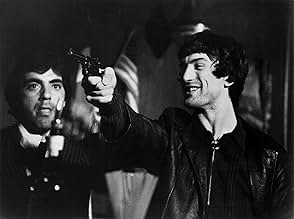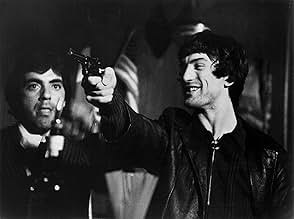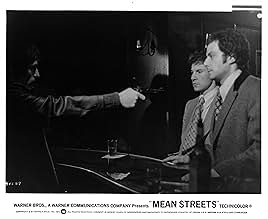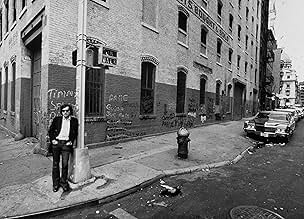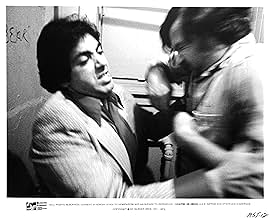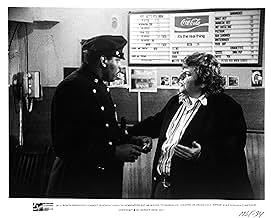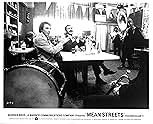In New York City's Little Italy, a devoutly Catholic mobster must reconcile his desire for power, his feelings for his epileptic girlfriend, and his devotion to his troublesome friend.In New York City's Little Italy, a devoutly Catholic mobster must reconcile his desire for power, his feelings for his epileptic girlfriend, and his devotion to his troublesome friend.In New York City's Little Italy, a devoutly Catholic mobster must reconcile his desire for power, his feelings for his epileptic girlfriend, and his devotion to his troublesome friend.
- Director
- Writers
- Stars
- Awards
- 5 wins & 5 nominations total
Victor Argo
- Mario
- (as Vic Argo, Victor Argo)
Murray Moston
- Oscar
- (as Murray Mosten)
- Director
- Writers
- All cast & crew
- Production, box office & more at IMDbPro
7.2126.3K
1
2
3
4
5
6
7
8
9
10
Featured reviews
Is he worth the bother?
I was never clear at just why Harvey Keitel was putting himself out on a limb for Robert DeNiro in Mean Streets. Sure he's taken with DeNiro's cousin Amy Robinson still I'm not sure he was worth the effort.
Keitel is a small time hood in Manhattan's Little Italy who's not really into it. DeNiro is another small time hood but he's completely and psychotically out of control. He's borrowed a few grand from local loan shark Robert Romanus and Romanus wants his money. Now during the climax scene DeNiro does ask a relevant question, why after he has borrowed and stiffed everyone in the neighborhood would you lend him any money?
In fact Keitel is all that's standing between DeNiro and gangster retribution. Is it all worth it even for Amy Robinson who is an epileptic and for some reason Keitel's uncle Cesare Danova thinks that disqualifies her as a potential bride.
The story is a bit muddled but the characters especially Keitel and DeNiro are unforgettable. Mean Streets made the career of both of them and of director Martin Scorsese. Keitel has become a valued character player and DeNiro a star with an astonishing variety of roles. In fact next to John Ford/John Wayne, Martin Scorsese/Robert DeNiro is probably the most successful director/player combination in film history.
This must have been a labor of love since Martin Scorsese grew up in Little Italy grown a lot smaller since he was a kid there. No doubt Keitel, DeNiro and the rest are drawn from characters he knew. His mom Catherine Scorsese also makes an appearance as she does in many of her son's works.
I don't think Mean Streets ranks up there with Casino, The Departed, The Aviator and Goodfellas, but it's an interesting work.
Keitel is a small time hood in Manhattan's Little Italy who's not really into it. DeNiro is another small time hood but he's completely and psychotically out of control. He's borrowed a few grand from local loan shark Robert Romanus and Romanus wants his money. Now during the climax scene DeNiro does ask a relevant question, why after he has borrowed and stiffed everyone in the neighborhood would you lend him any money?
In fact Keitel is all that's standing between DeNiro and gangster retribution. Is it all worth it even for Amy Robinson who is an epileptic and for some reason Keitel's uncle Cesare Danova thinks that disqualifies her as a potential bride.
The story is a bit muddled but the characters especially Keitel and DeNiro are unforgettable. Mean Streets made the career of both of them and of director Martin Scorsese. Keitel has become a valued character player and DeNiro a star with an astonishing variety of roles. In fact next to John Ford/John Wayne, Martin Scorsese/Robert DeNiro is probably the most successful director/player combination in film history.
This must have been a labor of love since Martin Scorsese grew up in Little Italy grown a lot smaller since he was a kid there. No doubt Keitel, DeNiro and the rest are drawn from characters he knew. His mom Catherine Scorsese also makes an appearance as she does in many of her son's works.
I don't think Mean Streets ranks up there with Casino, The Departed, The Aviator and Goodfellas, but it's an interesting work.
Quintessential early Scorsese, and one of De Niro's most convincing and varied roles.
The first time that Robert De Niro appears up-close in Martin Scorsese's Mean Streets is to the tune of the Rolling Stones' Jumpin' Jack Flash. It's from this point forward that the movie leaves the realm of being a 'good film' and becomes 'one of the greatest films of all time.' Simply put, the energy of Mean Streets is fantastic. De Niro's flamboyant entrance is one of many iconic moments in the film, which has influenced just about every crime film made since for good reason.
And yet ironically Mean Streets is rarely acknowledged as the masterpiece that it is, perhaps because a number of people actually forget about it. Everyone remembers Taxi Driver, Raging Bull and GoodFellas in particular, but Scorsese's breakthrough remains one of his most important and honest pieces of work, given little recognition apart from the praise by movie critics who do remember it.
Harvey Keitel, giving one of his most realistic and three-dimensional performances of all-time, plays the lonely and worried Charlie, a 20-something New York City Catholic who is haunted by his friend, Johnny Boy (De Niro), the local loner who has to jump off the sides of streets in order to dodge the local Mafia thugs he owes money to.
Mean Streets has been accused of lacking a point, and one critic calls it 'too real,' but I'd take this over most recent films any day of the week. Mean Streets doesn't have a dynamic arc like most motion pictures do sure, there's the rising action leading up to the climax, but it doesn't move from one frame to another trying to figure out the easiest way to end the movie while managing to stress all its points in such a manner so blatant that a four-year-old could pick up the themes.
It respects its audience enough to study its characters in such a way that they are given ten times as much depth as those seen in modern films released through Hollywood. As Johnny Boy, De Niro paints the ultimate portrait of a typical street loner a dumb kid who 'borrows money from everyone and never pays them back.' Charlie, much smarter and wiser, takes Johnny under his wing and tries to help him get a job, so that he can pay back what he owes to a local kingpin. However, Johnny is so irresponsible and stupid that he doesn't show up for work and begins fighting with the mob leading up to an inescapable conclusion that features some very ancient themes colliding together. It's the classic tale of redemption and escaping one's past, and if the film has a point it is that some people can't change and you'll get what's coming to you, even if you've got other people helping you out.
The film does have its technical flaws, such as poor dubbing, inconsistency, and the occasional goof. It's a raw movie, filmed on a low budget by a young and far more naïve Martin Scorsese. But all his typical elements are in place, to be expanded upon later in his career.
Keitel and De Niro are superb, particularly De Niro who shows great range very early on in his career. Almost unrecognizable in shabby clothing, hats and a scrawny figure to boot, this is a role that would typically be more suitable for Christopher Walken or other charismatic character actors but De Niro pulls off the role with intense talent, proving once again that he can handle any type of role. He's known for his psychotic roles, but in Mean Streets, he plays the opposite of Travis Bickle. Johnny Boy isn't unstable or psychopathic he's just wild and stupid.
Keitel channels all the thoughtful consciousness of an older child, considering Johnny Boy to be a brother of sorts. He feels that if he fails Johnny, he will somehow fail himself.
Mean Streets is a careful character study that never resorts to cardboard cutout caricatures or the standard clichés of the genre. Dialogue does not exist to move action forward towards the next adrenaline-packed sequence; Mean Streets focuses on its inhabitants with such strong emotional power that it's impossible not to be caught up in its grasp. A true classic from start to finish, and undeniably a very moving film.
And yet ironically Mean Streets is rarely acknowledged as the masterpiece that it is, perhaps because a number of people actually forget about it. Everyone remembers Taxi Driver, Raging Bull and GoodFellas in particular, but Scorsese's breakthrough remains one of his most important and honest pieces of work, given little recognition apart from the praise by movie critics who do remember it.
Harvey Keitel, giving one of his most realistic and three-dimensional performances of all-time, plays the lonely and worried Charlie, a 20-something New York City Catholic who is haunted by his friend, Johnny Boy (De Niro), the local loner who has to jump off the sides of streets in order to dodge the local Mafia thugs he owes money to.
Mean Streets has been accused of lacking a point, and one critic calls it 'too real,' but I'd take this over most recent films any day of the week. Mean Streets doesn't have a dynamic arc like most motion pictures do sure, there's the rising action leading up to the climax, but it doesn't move from one frame to another trying to figure out the easiest way to end the movie while managing to stress all its points in such a manner so blatant that a four-year-old could pick up the themes.
It respects its audience enough to study its characters in such a way that they are given ten times as much depth as those seen in modern films released through Hollywood. As Johnny Boy, De Niro paints the ultimate portrait of a typical street loner a dumb kid who 'borrows money from everyone and never pays them back.' Charlie, much smarter and wiser, takes Johnny under his wing and tries to help him get a job, so that he can pay back what he owes to a local kingpin. However, Johnny is so irresponsible and stupid that he doesn't show up for work and begins fighting with the mob leading up to an inescapable conclusion that features some very ancient themes colliding together. It's the classic tale of redemption and escaping one's past, and if the film has a point it is that some people can't change and you'll get what's coming to you, even if you've got other people helping you out.
The film does have its technical flaws, such as poor dubbing, inconsistency, and the occasional goof. It's a raw movie, filmed on a low budget by a young and far more naïve Martin Scorsese. But all his typical elements are in place, to be expanded upon later in his career.
Keitel and De Niro are superb, particularly De Niro who shows great range very early on in his career. Almost unrecognizable in shabby clothing, hats and a scrawny figure to boot, this is a role that would typically be more suitable for Christopher Walken or other charismatic character actors but De Niro pulls off the role with intense talent, proving once again that he can handle any type of role. He's known for his psychotic roles, but in Mean Streets, he plays the opposite of Travis Bickle. Johnny Boy isn't unstable or psychopathic he's just wild and stupid.
Keitel channels all the thoughtful consciousness of an older child, considering Johnny Boy to be a brother of sorts. He feels that if he fails Johnny, he will somehow fail himself.
Mean Streets is a careful character study that never resorts to cardboard cutout caricatures or the standard clichés of the genre. Dialogue does not exist to move action forward towards the next adrenaline-packed sequence; Mean Streets focuses on its inhabitants with such strong emotional power that it's impossible not to be caught up in its grasp. A true classic from start to finish, and undeniably a very moving film.
A look at life in NY
'Mean Streets', the earliest Scorsese film people have heard of, is the result of an on-form film maker, telling a personal story.
One thing to immediately note about 'Mean Streets' is the performance of our two leads, Harvey Keitel and Robert De Niro, both looking young and are full of energy. They deliver the goods, big time. They are both so watchable and make up at least half of the movie's appeal. In fact, 'Mean Streets' is an inherently watchable movie overall, helped by some fine dialogue and Scorsese's trademark energetic and involving camera-work. The main draw is the antics of the characters and their relationships rather than a high-stakes narrative. Dramatic things happen but don't relate intrinsically to the central plot: that of De Niro's character Johnny Boy, his debts to clubs, bars and old pals along with his long-suffering buddy Charlie (Keitel).
In comparison to other Scorsese films (which is inevitably going to happen if this is not your first Scorsese), it is very low on scale and as mentioned before, low on stakes. This is no gangster epic or psychological portrait but simply a 2 hour window into the streets of New York. It is certainly worth watching.
One thing to immediately note about 'Mean Streets' is the performance of our two leads, Harvey Keitel and Robert De Niro, both looking young and are full of energy. They deliver the goods, big time. They are both so watchable and make up at least half of the movie's appeal. In fact, 'Mean Streets' is an inherently watchable movie overall, helped by some fine dialogue and Scorsese's trademark energetic and involving camera-work. The main draw is the antics of the characters and their relationships rather than a high-stakes narrative. Dramatic things happen but don't relate intrinsically to the central plot: that of De Niro's character Johnny Boy, his debts to clubs, bars and old pals along with his long-suffering buddy Charlie (Keitel).
In comparison to other Scorsese films (which is inevitably going to happen if this is not your first Scorsese), it is very low on scale and as mentioned before, low on stakes. This is no gangster epic or psychological portrait but simply a 2 hour window into the streets of New York. It is certainly worth watching.
Mean Streets
Both Robert De Niro and Harvey Keitel are fantastic in Mean streets. I'm not a huge Robert De Niro fan as every time i see him act, i just think to myself that he Robert De Niro trying to be somebody. This is not the case in mean Streets for me. Instead he plays a kid who is young and stupid named Johnny boy. His performance is brilliant and is most likely one of his best. Keitel plays Charlie who looks out for Johhny. The opening line of the film basically tells you everything you would want to know about Charlie.
The film is gritty and shot in a documentary style with several tracking shots being carried out hand held. It takes the film 45 minutes to give you a clear plot and a clear understanding on what going to unfold. The last 20 minutes is directed perfectly with a palpable sense of suspense and is clearly the best ending you can give to this film. One negative would be that in the first half there literally no set pieces . Not a lot happens but saying this you get a clear understanding and fully engaged with the characters which makes the last 20 minutes outstanding.
It not the best film that Scorese has ever made but it clear by watching this that Mean Streets was his main starting point to his successful career
The film is gritty and shot in a documentary style with several tracking shots being carried out hand held. It takes the film 45 minutes to give you a clear plot and a clear understanding on what going to unfold. The last 20 minutes is directed perfectly with a palpable sense of suspense and is clearly the best ending you can give to this film. One negative would be that in the first half there literally no set pieces . Not a lot happens but saying this you get a clear understanding and fully engaged with the characters which makes the last 20 minutes outstanding.
It not the best film that Scorese has ever made but it clear by watching this that Mean Streets was his main starting point to his successful career
This movie is not just a good movie - It also is the movie which helped form the foundation of Martin Scorsese's later pictures.
Mean Streets
Directed by Martin Scorsese (1973)
Mean Streets came out in 1973 after Scorsese almost had the script under development in a decade. This is one of his first personal movies, describing the raw environment in the streets of Little Italy in NYC. We follow Charlie in the leading role and the bunch of guys around him. The hustler Johnny Boy owes a lot of money to the loan shark Tony and doesn't make his payments to him. Charlie now tries to work out a deal with Tony and is trying to get Johnny Boy to pull himself together, even though this looks like an impossible mission.
Scorsese's first motion picture Who's That Knocking at My Door and Mean Streets have many resemblances and contain the typical trademarks that Scorsese is now well known for. He almost always makes a character study of the life of lonely men, who are trying to get the best out of their situation in the asphalt jungle. Hustling, working, drinking, taking drugs etc. are very typical things to do for the persons appearing in his movies.
Mean Streets is photographed mostly with a hand hold camera, which helps create a raw look that fits pretty good to this environment. Also the movie doesn't contain an actual score. Actually songs from the director's personal music collection do work as the background music. The plot is this picture is only secondary. This is like many of Scorsese's other movie primarily a character driven story with a raw environment description.
The movie marks the start of one of the greatest director/actor collaborations ever! The role of Johnny Boy was Robert De Niro's role in a Scorsese picture, and later on he went to bigger leading roles under the director, which gave them both the reputation that they have today. Also this is Harvey Keitel's second leading role in a Scorsese picture, but after this movie Keitel and De Niro kind switched roles (see Taxi Driver).
This movie is not just a good movie - It also is the movie which helped form the foundation of Martin Scorsese's later pictures.
8/10
- "I f*uck you right where you breathe"
Directed by Martin Scorsese (1973)
Mean Streets came out in 1973 after Scorsese almost had the script under development in a decade. This is one of his first personal movies, describing the raw environment in the streets of Little Italy in NYC. We follow Charlie in the leading role and the bunch of guys around him. The hustler Johnny Boy owes a lot of money to the loan shark Tony and doesn't make his payments to him. Charlie now tries to work out a deal with Tony and is trying to get Johnny Boy to pull himself together, even though this looks like an impossible mission.
Scorsese's first motion picture Who's That Knocking at My Door and Mean Streets have many resemblances and contain the typical trademarks that Scorsese is now well known for. He almost always makes a character study of the life of lonely men, who are trying to get the best out of their situation in the asphalt jungle. Hustling, working, drinking, taking drugs etc. are very typical things to do for the persons appearing in his movies.
Mean Streets is photographed mostly with a hand hold camera, which helps create a raw look that fits pretty good to this environment. Also the movie doesn't contain an actual score. Actually songs from the director's personal music collection do work as the background music. The plot is this picture is only secondary. This is like many of Scorsese's other movie primarily a character driven story with a raw environment description.
The movie marks the start of one of the greatest director/actor collaborations ever! The role of Johnny Boy was Robert De Niro's role in a Scorsese picture, and later on he went to bigger leading roles under the director, which gave them both the reputation that they have today. Also this is Harvey Keitel's second leading role in a Scorsese picture, but after this movie Keitel and De Niro kind switched roles (see Taxi Driver).
This movie is not just a good movie - It also is the movie which helped form the foundation of Martin Scorsese's later pictures.
8/10
What Scorsese Film Ranks Highest on IMDb?
What Scorsese Film Ranks Highest on IMDb?
Cinema legend Martin Scorsese has directed some of the most acclaimed films of all time. See how IMDb users rank all of his feature films as director.
Did you know
- TriviaTo really get inside Harvey Keitel's drunken scene, the camera was actually strapped to the actor while he swayed about, and under-cranked to give it a woozy, drunken feel.
- GoofsYou can see Robert De Niro's mic pack on his back when he gets up to walk to the window at Charlie's house after staying the night.
- Quotes
[first lines]
Voice in Charlie's Mind: You don't make up for your sins in church. You do it in the streets. You do it at home. The rest is bullshit, and you know it.
- Alternate versionsNBC edited 10 minutes from this film for its 1977 network television premiere.
- ConnectionsEdited into American Cinema: Film Noir (1995)
- SoundtracksJumpin' Jack Flash
Written by Mick Jagger (as M. Jagger), Keith Richards (as K. Richards) (uncredited)
By The Rolling Stones
Courtesy of ABKCO Records
- How long is Mean Streets?Powered by Alexa
Details
- Release date
- Country of origin
- Official site
- Languages
- Also known as
- Calles peligrosas
- Filming locations
- Production companies
- See more company credits at IMDbPro
Box office
- Budget
- $500,000 (estimated)
- Gross US & Canada
- $32,645
- Opening weekend US & Canada
- $32,645
- Mar 15, 1998
- Gross worldwide
- $61,676
- Runtime
- 1h 52m(112 min)
- Color
- Aspect ratio
- 1.85 : 1
Contribute to this page
Suggest an edit or add missing content





